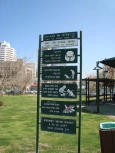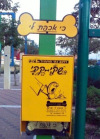Unique habitat Be’er-Sheva and its environs provide a rare, semi-arid loess habitat, harboring a number of unique species of desert animal life not found elsewhere on Earth, such as the spotted desert lizard, Shnunit Be’er-Sheva (Lat., Acanthodactylus beershebensis) and a small mammal nonetheless called the Great Jerboa (Lat., Allactaga major). On hot summer days, you can stroll along a seasonal watercourse (e.g., Yud Aleph Park) and see lizards sunning themselves.
Earth, such as the spotted desert lizard, Shnunit Be’er-Sheva (Lat., Acanthodactylus beershebensis) and a small mammal nonetheless called the Great Jerboa (Lat., Allactaga major). On hot summer days, you can stroll along a seasonal watercourse (e.g., Yud Aleph Park) and see lizards sunning themselves.
In September 2023, a cageless, open-air, eco-experiential, desert animal park, “Midbarium” was established in Be’er-Sheva just NW of the Country Club on ca. 140 dunams of land, sponsored by Jack, Joseph & Morton Mandel, and managed by Ziv Reshef, former Manager of the “Negev Zoo.” 


Haggai Ein-Dor is a licensed snake catcher and breeder – 054-5293838, as is Itai Tessler – 052-3704297 – should the need arise. Back when Be’er-Sheva was still a tiny settlement, most bordering on open desert, quite frequently desert snakes, spiders and scorpions wandered into residential areas; this is quite rare now in the large metropolitan city. In any case, they are to be avoided and, should anyone be bitten, they should be rushed immediately to the Soroka ER, preferably along with the dead ‘biter’, so the right anti-venom can be used immediately.
A multitude of indigenous species
A surprisingly large number and variety of mammals, reptiles and insects are natural residents of Be’er-Sheva. As of the comprehensive survey done in 2016, entitled Be’er-Sheva Municipal Nature Survey, there are at least 256 indigenous species of animals in the Be’er-Sheva metropolitan area. To name just a few examples, they range from: moles, porcupines, badgers, desert turtles, mice & rats; to snakes, lizards, chameleons & snails; and to dragon-flies, butterflies, praying-mantises & bubble-bees. In fact, of butterflies alone 36 species were observed, as were 19 different types of local reptiles and ca.60 nesting species of birds! For several years now, I have a family of nocturnal porcupines residing in my garden, who come out to feed on temperate nights.










In support of the reality of the Hebrew Biblical plagues (carried on hamsin winds across the Sinai Desert from Egypt), I personally witnessed a brief demi-‘plague’ of small emerald-green frogs that appeared all over my yard sometime in the late 1980s. Then,  there was a short-lived ‘plague’ of flying locusts in the early 1990s, when I learned that locusts are kosher and that the poor Yemenite-Jews in 1950s Be’er-Sheva had sent their children out to catch them, to make locust soup, that apparently tastes somewhat like chicken soup. Another ‘almost plague’ was thwarted before reaching Be’er-Sheva in 2015.
there was a short-lived ‘plague’ of flying locusts in the early 1990s, when I learned that locusts are kosher and that the poor Yemenite-Jews in 1950s Be’er-Sheva had sent their children out to catch them, to make locust soup, that apparently tastes somewhat like chicken soup. Another ‘almost plague’ was thwarted before reaching Be’er-Sheva in 2015.
Migrating birds Many of the ca. 500 million birds that migrate over Israel annually (passing between Asia, Europe & Africa) fly over or stop in our welcoming Be’er-Sheva
(passing between Asia, Europe & Africa) fly over or stop in our welcoming Be’er-Sheva oasis. For example, large white storks fly over every Fall and again when returning to Europe in the Spring, while smaller wintering birds, like the European stonechat, stop here for the duration, before flying back to Europe and northern Asia. Summering birds, such as the European turtle dove, arrive in the Spring and return to Africa and Asia come the end of July-August. In 2017, 117 bird species were sighted in Be’er-Sheva by local ornithologists (8th place in Israel sightings). The Negev Birdwatching Center offers guided bird-watching
oasis. For example, large white storks fly over every Fall and again when returning to Europe in the Spring, while smaller wintering birds, like the European stonechat, stop here for the duration, before flying back to Europe and northern Asia. Summering birds, such as the European turtle dove, arrive in the Spring and return to Africa and Asia come the end of July-August. In 2017, 117 bird species were sighted in Be’er-Sheva by local ornithologists (8th place in Israel sightings). The Negev Birdwatching Center offers guided bird-watching outings – 08-6414470/77. One year, a large orange & turquois kingfisher passing through ate all the tiny goldfish in my garden pond before I caught on … ; a propos, a nice goldfish pond may be seen at the Druyan Plant Nursery.
outings – 08-6414470/77. One year, a large orange & turquois kingfisher passing through ate all the tiny goldfish in my garden pond before I caught on … ; a propos, a nice goldfish pond may be seen at the Druyan Plant Nursery.
Endangered indigenous birds include: the Lesser kestrel, the Red falcon, the Houbara bustard and various types of bats, eagles & owls.
Israel’s nat ional bird, the striking red-combed, black & white-striped Hoopoe, also resides in Be’er-Sheva.
ional bird, the striking red-combed, black & white-striped Hoopoe, also resides in Be’er-Sheva.
Native birds that nest in Be’er-Sheva include: doves, starlings, hoopoes, bulbuls, humming birds, white desert owls, bats and others. Often at dusk, flocks of starlings may be seen swirling above the
others. Often at dusk, flocks of starlings may be seen swirling above the City Hall.
City Hall.
Pets As for pets, the Ben-Gurion University of the Negev is a ‘cat haven’. It keeps its Campus cats innoculated, spayed and very well loved and fed by the students, some of whom also care for and train seeing-eye dogs.
Campus cats innoculated, spayed and very well loved and fed by the students, some of whom also care for and train seeing-eye dogs.  A propos dogs, the Be’er-Sheva Municipality
A propos dogs, the Be’er-Sheva Municipality  has strict regulations (and stiff fines) for dog owners: dogs must be vaccinated; may be loosed only in home enclosures or
has strict regulations (and stiff fines) for dog owners: dogs must be vaccinated; may be loosed only in home enclosures or  leashed or muzzled in public areas; any dog poop on public paths must be collected and disposed. There are now 4 designated “dog parks” around the city, and more are being prepared.
leashed or muzzled in public areas; any dog poop on public paths must be collected and disposed. There are now 4 designated “dog parks” around the city, and more are being prepared.
Dangerous dogs, such as: Amstaffs, Bull Terriers, Argentine Dogues, Japanese Tosas, Fila Brasileiros & Rotweilers, require annual licensing, neutering at 6 months, a closed yard, a warning sign in the entrance, an adult walker and a muzzle. Any wild dog sighted should be reported immediately to the Municipal Veterinary Dept. – 08-6270099 or 052-4377998. Hagar Rubin is a professional dog trainer – 054-6814885. There are pet shops galore; some even deliver pet food to your home for free!
Medical care Be’er-Sheva has professional veterinarians (Dr. Tatiana Vaisman even makes house calls – 054-7699071), a veterinary clinic Mirparinaria – 08-6279010, and a nearby Veterinary Hospital just off Hebron Road at the Tel Sheva junction – 08-9953681. The district office of the Ministry of Health treats animal and insect bites – 08-6263553. The Be’er-Sheva S.P.C.A. (founded 1976) should be contacted to pick up strays and to adopt adorable pets – 08-6232894, 08-6238118, 08-6281808. Pets may also be adopted via the “Be’er-Sheva Loves Animals Society” – 052-4377998 or beer7la@gmail.com.
 Special recognition of Be’er-Sheva as the paragon of animal rights & welfare – In 2018, the Israel Knesset’s Animal Rights Coalition chose the City of Be’er-Sheva as the Israeli city best exemplifying animal rights and welfare, and invited Mayor Ruvik Danilovich to speak about the many enacted & functioning pro-animal projects.
Special recognition of Be’er-Sheva as the paragon of animal rights & welfare – In 2018, the Israel Knesset’s Animal Rights Coalition chose the City of Be’er-Sheva as the Israeli city best exemplifying animal rights and welfare, and invited Mayor Ruvik Danilovich to speak about the many enacted & functioning pro-animal projects.
Annual pet-related events For information on the CAC  International Dog Show, with over 100 breeds shown, judged & sold or the Junior Dog Groom Championship – 03-6727174, http://www.ikc.org.il.
International Dog Show, with over 100 breeds shown, judged & sold or the Junior Dog Groom Championship – 03-6727174, http://www.ikc.org.il.

As strange at it may sound, fish lovers from all across Israel gather at the Reef Center in the Ramot neighborhood once a year, here in the Negev Desert, to discuss raising pet-fish in gold-fish bowls and aquariums – 077-200-2012.